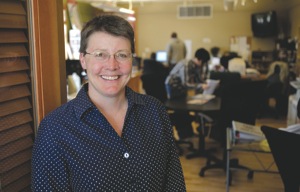-
- Maine gov. signs same-sex marriage bill
- Hundreds march in Philly national gay-rights rally
- NC Rep. Foxx calls hate crime murder case a ‘hoax’
- U.S. poll: mixed views on gay-rights issues
- GLBT community thriving in conservative Utah
- NH Senate votes to allow same-sex marriage
- Transsexual wins $500,000 lawsuit
- National News Briefs
- World News Briefs
national
GLBT community thriving in conservative Utah
This is “the best time” to be gay in Utah, activists say
Published Thursday, 07-May-2009 in issue 1115
SALT LAKE CITY (AP) – Valerie Larabee is a lesbian, out and living in Salt Lake City, where the shadow of the Mormon Church can feel long and cold for people who are gay.
“My friends who don’t live here think I’m nuts,” said Larabee, a former Air Force officer and financial planner, who moved to Utah in 1997 and now runs the Gay Pride Center on Salt Lake City’s west side.
While much of the country moves in fits and starts toward greater acceptance of gay people and endorsement of equal rights, the politically active Church of Jesus Christ of Latter-day Saints and the often ultra-conservative Mormon-dominated Utah Legislature have found themselves squarely on the opposite side of that trend.
In the U.S., same-sex marriage is legal in Connecticut, Iowa, Massachusetts and Vermont. Utah has made it illegal twice: Once in statute and again when voters banned the practice in the state constitution.
Undaunted, activists say the current political and social climate in many ways make this “the best time” to be gay in Utah. The gay, lesbian, bisexual and transgender community – especially along the population-dense Wasatch Front – is growing, vibrant and energized.
“I think we are the frontline of the culture war,” said Troy Williams, a former Mormon and the gay host of “Radioactive,” a talk show on public radio. “This is where the fight is, and this is where the really exciting stuff is happening.”
At the urging of their church leaders, Latter-day Saints were vigorous proponents of Proposition 8, the California campaign to outlaw same-sex marriage. Members in California and Utah gave some $16 million and the church itself, nearly $300,000. A backlash of protests, which were directed in part at Utah as a whole, seemed to baffle the church.
And while Republican Gov. Jon Huntsman, who is Mormon, this year endorsed civil unions and related rights, his position was very nearly drowned out by the inflammatory remarks of a state legislator.
In an interview with documentary filmmaker Reed Cowan, state Sen. Chris Buttars, R-West Jordan, compared gay activists to Muslim terrorists and said they were “probably the greatest threat to American going down.”
“What is the morals of a gay person? You can’t answer that, because anything goes. So now you’re moving toward a society that has no morals,” Buttars said in the interview aired in February by ABC affiliate KTVX in Salt Lake City.
The remarks outraged members of the GLBT community in Utah and elsewhere. Even the Mormon church issued a statement that Buttars, who is Mormon, was not speaking on its behalf.
On Utah’s Capitol Hill, however, Buttars’ right to free speech was defended. Senate President Mike Waddoups, R-Taylorsville, removed Buttars from a committee chairmanship, but said many in the Legislature agreed with some of Buttars’ remarks. He declined to be specific.
If the intent has been to send a message that Utah is not the place for the gay-rights movement, the result has been just the opposite.
“I do believe … [Buttars is] helping our cause because he’s irrational,” said Larabee, who was deeply offended by the suggestion that gays have no morals. “To some people what he’s saying is gospel, but to fair-minded folk, it’s crazy-making.”
Utah “is the perfect place in the country” to have the gay-rights conversation, said Larabee, noting the church’s own history. The Mormon Church has struggled for mainstream acceptance and once fought for an alternative to traditional marriage – polygamy.
The Mormon Church disavowed plural marriage in 1890 to pave the way for Utah’s statehood. Church leaders have often tried to dismiss the theology and distance themselves from the past. But Utah and other parts of the Intermountain West have tens of thousands of polygamists, whose beliefs are mostly rooted in early church teachings.
Mormons believe traditional marriage is a pillar of society that was ordained by God. Gays are welcome in the church, but can only retain service callings if they remain celibate. Some gays have been excommunicated for acting on what the church calls “same-gender attraction.”
Ernest “Coop” Cooper, 25, a gay ex-communicated Mormon studying at Utah State University in Logan, said that Buttars’ slurs were like pouring salt on an open wound. He said he feared for his safety after his name was published in the local newspaper on a letter from students opposed to Proposition 8. Online comments from readers rudely bashed Cooper’s sexuality and said he was trying to “promote the work of the devil.”
“One said I should be treated just like a dog who needed to have his face sprayed with water, so I would stop humping everybody’s leg,” said Cooper, who plans to leave Utah after graduation.
Michael Thompson, executive director of Equality Utah, sees the movement gaining ground. Each action by the Mormon Church against same-sex marriage and each maligning statement from a lawmaker only serves to strengthen the cause, he said.
More people – of all sexual orientations – are turning out for community organizing meetings, want training as citizen lobbyists and are showing up for events like the post-Proposition 8 election protest march around the Salt Lake City Mormon temple that drew an estimated 3,000.
|
|
Copyright © 2003-2025 Uptown Publications


